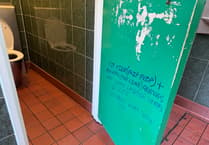The links a 17th century mansion has with the food industry could hit the sweet spot for renovation funding according to those hoping to restore the building.
Plas Gunter Mansion in Abergavenny is in need of repairs but a pre-Covid Heritage Lottery Fund application needs to be resubmitted with details on how the building will benefit the community.
The Plas Gunter Mansion Trust team are now hoping to look into the building’s historic links with an 18th century confectioner and Abergavenny’s culinary reputation to convince the HLF of the importance of the building in the local area.
The Grade II* listed mansion is named after the Gunter family, key players in the confectionary trade during the 18th century.
It has a darker past with Wales’ last catholic martyr having once held clandestine services in a secret chapel in the attic at a time when Catholic worship was illegal and dangerous.
One of the priests was exposed to Parliament by priest-hunter John Arnold of Llanfihangel Court, near Abergavenny.
He was then arrested, hanged, drawn and quartered at Usk on August 27 1679.
The discovery of this secret chapel means Plas Gunter is the only known recusant chapel that exists in Wales and one of the best surviving examples in the whole of Britain. “With any heritage project you’re in it for the long game,” says Owen Davies, Chair of the Plas Gunter Mansion Trust.
“And the next 12 months are going to be critical. It’s important that we get the application right because the size of our project would take up all the funds available in one funding round for Wales so we have to make it as good as it possibly can be.”
The team have established a connection between the mansion, the Gunter family and Regency London.The Gunters, who built and lived in the building on Cross Street, would go on to be key players in the confectionery world, continuing to the present day.
“It seemed fitting to explore this part of the Gunter story because of Abergavenny’s reputation as a food destination,” said Mr Davies, adding that they’ve been awarded a development grant to look further into the food connection.
The Abergavenny Food Festival as well as the establishment of one of the UK’s first gastro pubs, The Walnut Tree - opened in the early 1960s by Franco Taruschio - have placed Abergavenny firmly on the UK and European culinary map.
Recently, part of the Gunter mansion was “The Pot and Pineapple”, a traditional sweet shop opened by Amanda Peters who was instrumental in initiating the building’s restoration project. The shop was so named because of the mansion’s historical connection with London in the 18th Century.
Anne Gunter was the sister of Walter Gunter, the last Gunter we know to have lived in Plas Gunter Mansion. Anne married Domenico Negri, a skilled confectioner & ice cream maker and together they set up The Pot & Pineapple on Berkeley Square, London in 1757.
Anne Gunter herself ran the business and it became Gunter’s Teashop which Jane Austen name-checked in her novels. The recipe books, Gunter’s Modern Confectioner and The Complete Confectioner published in 1789, are still available and the business survives today as high-end event caterer, Payne & Gunter.
As the team continues to work with funding experts to put together their bid, they are keen to bring more volunteers into the fold and to raise more funding in donations for the general upkeep of the building and the pop-up exhibition space which is open Tuesdays and Saturdays from 10.30 until 4pm between March and December.
Anyone interested in helping out should contact the Deborah Holland at: [email protected] or pop into the shop to speak to a volunteer on Tuesdays or Saturdays.
More information, including a 360-degree video tour of the building as it is, is available on the website: plasguntermansion.org.uk where there is also a ‘Donate’ button





Comments
This article has no comments yet. Be the first to leave a comment.